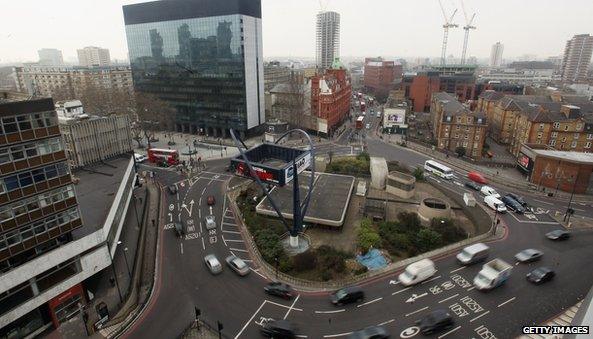Silicon Britain: Inside the country's tech clusters
- Published

Hundreds of tech firms are based near the "Silicon Roundabout" in east London
"This is a really cool spot and I think a lot of magic is going to happen here," Google's Eze Vidra says as we reach the cafe area of Google Campus, the company's new shared workspace for start-ups.
The cafe, Mr Vidra says, is all about "serendipitous moments" - chance encounters that may lead to a new innovation or business idea.
"We're going to have some cool yoga furniture, and you can just sit here and code, and have a quiet video conference call," he says ducking his head to enter a black painted chill-out space next to the dining area.
Google Campus is the firm's contribution to the Silicon Roundabout - a concentration of technology companies clustered in the immediate area around a large, busy roundabout in the Old Street area of East London.
The five-storey building is designed as a co-working space for tech start-ups, created in partnership with other start-up facilitators such as Tech Hub, Seedcamp, Central Working and Springboard.
"Until now you didn't have this one central meeting place where all start-ups can meet each other, can meet investors, attend events, participate in hackathons etc.," Mr Vidra tells the BBC.
The logic of Campus is the logic of the Silicon Roundabout area; that tech firms benefit from being near other similar businesses.
Meanwhile, the government has been keen to encourage the growth of Tech City - an area which encompasses the Silicon Roundabout, and stretches out to the newly-developed Olympic Park.
It is just one of several technology clusters across the UK.
Eric Van der Kleij is the chief executive of the UK government's Tech City Investment Organisation, tasked with promoting the interests and needs of the area.
He thinks the power of such clusters is in something he calls "collisions".
"Because you have so many start-ups and so many investors all concentrating in one area, you find those wonderful accidental collisions that create both innovation as well as opportunity."
Tech City
The government sees technology as an industrial sector with the potential for growth.
In February, Business Secretary Vince Cable wrote, in a leaked letter to the Prime Minister, that "technology leadership must drive economic activity in the future" adding that the "digital/creative industries" had "huge potential".
Among the good things the government had done, he pointed to "supporting the growth of Tech City".
But does it make sense to encourage the growth of clusters of web companies when the internet is itself a communications technology that breaks down geographic barriers?
"The cluster is very important because it is quite difficult, even with all the best technology tools, as humans to achieve that incredibly important face-to-face communication," says Mr Van der Kleij.
He believes that by bringing experienced entrepreneurs together with new companies and investors with start-ups, tech-hubs can help grow business.
"So that is what Tech City and the clusters and the hubs provide," he adds.
Silicon Fen
The history of "picking winners" as the basis of industrial policy, is as Vince Cable acknowledged in his letter, mixed.
But in another British "Silicon" there's a company whose success the business secretary hopes others can emulate.

An employee shows off an Arm-powered game controller built as a demo.
Arm Holdings, based in Cambridge - an area dubbed "Silicon Fen" - designs microprocessors widely used in tablets and smartphones.
"If you have a smartphone or a tablet there's a 100% chance you'll have chips in there designed by Arm," says chief executive Warren East.
Mr East thinks governments can encourage tech-hubs to grow, but he thinks their formation is organic and is not possible for governments to engineer.
"I think the government can encourage but its very hard for the government to create something that doesn't form naturally," he says.
He believes there are a number of ways to boost the British tech industry, and a key element is celebrating British success.
"The government can do things to encourage technology businesses: financial incentives like patent boxes, R&D credits and all those sorts of things," says Mr East.
"The other really important thing the government can do is foster a culture which encourages it, celebrates the success of UK technology companies and educates people about how successful these companies are on the global stage."
Silicon Glen
But as well as tales of success, the UK has also witnessed declines in high-tech manufacturing.
Standing outside the old Motorola plant in East Kilbride, part of the area known as Silicon Glen, there's evidence of tech boom, tech bust and of some "green-shoots".
In the vast factory complex, the only sign of life is the hum of a petrol generator as crews work on the abandoned interior - the empty spaces of the fenced-off car park testament to the thousands who would at one time have worked there.
But in the offices adjoining the plant, a company called Freescale employs 180 people designing hi-tech automotive systems.

Freescale, based in East Kilbride, design hi-tech automotive systems like this digital dashboard
As he demos a prototype digital dashboard, Freescale's Andy Birnie describes how the tech sector in Scotland has changed.
"We've got a lot of start-ups, a lot of design companies. It's moved away from the manufacturing up the value chain," he says.
Like Google, he thinks tech clusters make sense.
"It's difficult to innovate on the phone, it's difficult to innovate on a weblink, so there is a case for having people with complementary skills in the local area."
Derek Boyd also has a long history in Silicon Glen. Now representing NMI - the trade body for the Electronic Systems Industry - he runs through what he sees as the other silicon hubs in the UK.
"The way we see it there's Silicon Glen, Silicon Fen in Cambridge and Silicon Gorge near Bristol - if you look a bit more closely you'll find there's a strong cluster along the M4."
Yet Mr Boyd wonders if seeing the UK as a series of technology clusters is the best way to develop the industry.
"We're not great believers in that policy," he says, arguing instead it is more important to view the UK as a whole.
As well as increasing Britain's competitiveness and investing in skills, Mr Boyd believes that part of the problem is a failure to recognise success.
"The electronic systems industry is much stronger than most people realise.
"We are dealing with a technology that's hidden from the public view, and the UK happens to be very good at it."
Emerald Valley
But not everyone is hoping for success on the scale of the Silicon Valley giants.
The team behind the Emerald Valley, headquartered in Newry in Northern Ireland, believe that small business can also be good business.
Without direct government funding they're trying to create a tech cluster in the city of around 30,000 souls.
"We're not going to build the next Google," says Nicola Bates, the project's co-founder.
"We should be trying to encourage the things that we do well - the small, niche, high-end products."
Their offices, in a renovated Victorian building on a street dotted with boarded-up businesses, might be rather different from the Google Campus in Shoreditch but they share common aims.

Nicola Bates believes the 'Emerald Valley', in Northern Ireland, can home its own tech hub
An elegant open-plan space in what was a bath house provides a space for meetings and events.
Emerald Valley has been inspired by the success of one local company.
"We have a founder here of a publicly held company, First Derivatives, which is entirely home grown, and what we want to do is create more of that," Ms Bates says.
The team opened its working space for local tech hubs in November. Already the office is full.
While some mocked their ambition, Ms Bates believes the opportunities presented by digital industries are available to any town with good connections to the internet.
"Once you've access to the internet you've access to the world," she says.
- Published19 March 2012
- Published27 January 2012
- Published28 September 2011